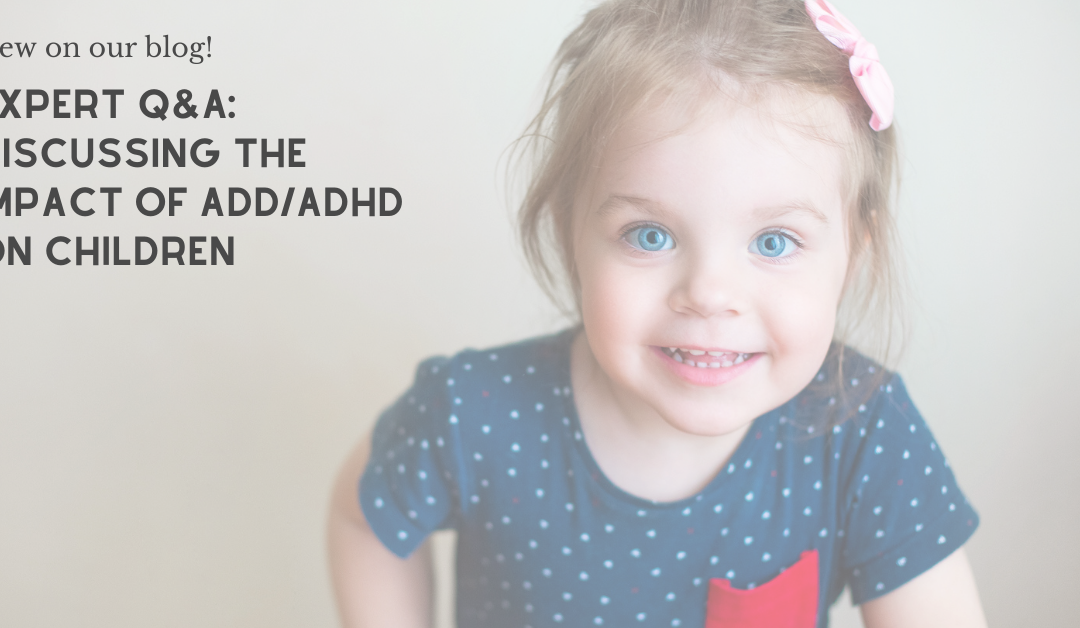Attention Deficit Disorder (ADD) and Attention Deficit Hyperactivity Disorder (ADHD) are neurodevelopmental disorders affecting children and adults around the world. In the U.S., it’s estimated that about 10% of children and 5% of adults have ADD and/or ADHD. In honor of National ADD/ADHD Awareness Month, we sat down with Matthew D., a Behavior Management Therapist at MENTOR South Bay, to break down important information about the two disorders.

Is there a difference between ADD and ADHD?
There is a slight difference. Usually with ADHD, you have a combination of inattentive and hyperactive behaviors. Whereas with ADD, the child’s behavior is mostly inattentive in nature – you typically don’t see hyperactivity. Everyone deals with a wandering mind from time to time, but children with ADD deal with daydreaming and a wandering mind pretty frequently throughout the day. Both of them do need to be treated equally, and the interventions we implement at MENTOR South Bay can be effective for both.
National ADD/ADHD Awareness Month is a time to talk about these disorders and debunk myths. What is the most common myth you’ve come across when it comes to ADD and ADHD?
From what I hear from parents and families, there’s a myth that the hyperactivity we see in children with ADHD is a form of behavior defiance. Quite the contrary, the child who is hyperactive is struggling. They struggle to keep themselves focused. And, it’s not always forced activities that they struggle to focus on – sometimes it’s activities that they actually enjoy. Even then they have trouble focusing, and that can lead to a lot of frustration if it’s not treated and not met with the proper support. These children need that emotional support – at home, at school and in their community.
There’s also the myth that these disorders are permanent and not treatable. With the right emotional support, those that live with ADD and ADHD can live healthy and productive lives. It doesn’t have to define them completely. Oftentimes, parents will think their child with ADHD will struggle to make friends or that their child won’t thrive. It’s important for them to know that, with the right interventions, it’s certainly treatable.
We typically think of these disorders solely impacting children, but can ADD and ADHD continue into adulthood?
It can manifest itself into adulthood. With the right amount of support from family, teachers, outside providers and coaches, the child can eventually learn ways to cope with ADD and ADHD to the point where it’s managed. But, sometimes children will see they exhibit symptoms into adulthood.
It’s important to treat this early, because there is the risk the child can develop low self-esteem, depressive symptoms, anxiety, a sense of hopelessness, etc. Working in a team-based format, like we do at MENTOR South Bay, helps the family understand the diagnosis and understand what treatment options are out there.
What type of interventions do you use when you’re working with someone who has ADD/ADHD?
Most of my cases are behavioral in nature. When I’m developing my plans, I gather the data; get to know the child more; and become familiar with the family’s day to day routine. From there, we offer strategic insight, such as identifying ways the family can incorporate breaks during the day for the child and finding activities the family can enjoy together, such as dance, music or art. This helps the child have a sense of predictability during the day. It also gives them an opportunity to have a little control over their day. You want the family to be mindful of what their day-to-day expectations look like because these expectations will help the child make informed and healthy decisions later on in life. We understand that families are busy, but sometimes it’s a matter of taking a look at your schedule and seeing if you can fit in at least 5-10 minutes of this preferred activity over the course of the day. This will help the child feel a sense of accomplishment when those tasks are completed successfully.
If you or someone you know is interested in services that help children or adults diagnosed with ADD/ADHD, our team of certified clinicians can help. For more information, contact us at 508-427-5362.

